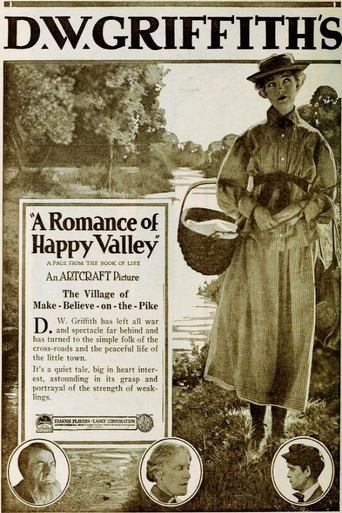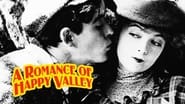JohnHowardReid
There are two things wrong with the title: (1) The movie is not a romance. Well, not primarily anyway. There is a romance between Lillian Gish and Robert Harron, but it is very secondary to the main plot. (2) It's not a happy valley and never was until right at the end of the movie. On the other hand, it's certainly not a dull picture. In fact, it's rather unique in its way. It's the only movie I know of in which the main character gets away with deliberately murdering someone in order to rob him – a hideous act made even more pointed because the murderer is one of those religious bigots who not only revel in their own supposed intimate relationship with God, but go out of their way to demean all those neighbors who don't go about their religious "duties" with the same fervor, or worse still, don't keep Sundays holy and churchy at all. George Fawcett plays this hideous monster most convincingly – and that, of course, makes his act of deliberate, forethought murder all the more shocking. But even more startling to all the censors – at least until a few years ago – is that the murderer is not brought to book at all. He actually gets away with it! Fortunately, this fact is not emphasized. Instead the movie ends on an optimistic note when our hero, Robert Harron, returns home to marry his childhood sweetheart, Lillian Gish. Mind you, he hasn't bothered to communicate with her or even send her a postcard for eight or ten years, even though he promised he would! But she waits patiently for him all the same. That's love! A print is now available on a good Alpha DVD.
MartinHafer
Back in the early 20th century, D.W. Griffith was an innovative filmmaker. He managed to tell wonderful stories and was wildly popular through the 1910s. However, as the years passed, Griffith went from being an innovator to being very old fashioned and stodgy. It wasn't that his films had changed so much as times had changed and he hadn't kept up with them. This is strongly evident with his "A Romance of Happy Valley"—a film which worked in 1919 when it debuted but which would just seem hokey into the 1920s. This is because the film is extremely moralistic and the subtitles often come off as preachy homilies than anything else.The story is one close to Griffith's heart. After all, like the characters in the story, he grew up in rural Kentucky and he idealized its simple way of life. Oddly, however, the film decries the evils of moving to the big city—something Griffith himself did when he packed up and moved to Los Angeles. While the city was hardly a metropolis at the time, compared to his native Kentucky, it was practically sin city! The story is about a country boy named Johnny. After hearing a New Yorker talk about how wonderful the big city is, Johnny is determined to go there and make his fortune. The problems are that Jennie (Lillian Gish) is in love with him and his parents have worked hard on the farm in order to pass it down to him. Regardless, he eventually does go to New York and soon learns about the drudgeries of city life. And, while he promised to return in one year, one year soon stretches to eight! What's to become of Jennie and Johnny's farm? If you could re-write the heavy-handed intertitle cards (which sound more like the teachings of Norman Vincent Peale than those of a filmmaker), didn't use white folks painted black* as well as NOT made all the references to Judas Iscariot for one of the characters, the film would have worked a lot better. After all, the ending is very creative and the cinematography was lovely. Worth seeing but is extremely old fashioned and is not among Griffith's better work. And, if you've seen other films like Griffith's "Home, Sweet Home" you'll see that the themes in "A Romance of Happy Valley" are often repeated in his work.*After watching this film and other Griffith films (especially "Birth of a Nation"), I can only conclude that Griffith must have really hated black people. Again and again, instead of hiring black actors, he usually just had white guys paint themselves with burnt cork to play black parts. An enlightened guy he wasn't—and may help explain why such an important early filmmaker is all but forgotten today.
wes-connors
Must all director D.W. Griffith's stories make a moral point? "A Romance of Happy Valley" offers one readily: "Harm not the stranger within your gates, lest you yourself be hurt." By the film's end, this is shown to be excellent advice. At a Kentucky back-country inn, poor country boy Robert Harron (as John L. Logan Jr.) dreams about making his fortune in the Big City (New York). Hard-working father George Fawcett (as Logan Sr.) and Bible-loving mother Kate Bruce (as Mrs. Logan) don't want to see their son gallivant off to the Wicked City; they want him to remain down on the farm. Girl-next-door Lillian Gish (as Jennie Timberlake) is also afraid she will lose Harron to big city ways… Robert Harron and Lillian Gish. Corn rustling in the wind. Rustic fences. Of course, this an absolutely gorgeous picture. Griffith and photographer G.W. Bitzer create an extraordinary, classic landscape; and, "A Romance of Happy Valley" is one of their most perfect collaborations. Harron is especially poignant; portraying "Johnny Logan" as an innocent country boy who longs to better his lot in life. His is the film's struggle: the comfort and stability known in simple, rural life vs. the promise of wealth in the unknown, urban city. The story is about Temptation; and Harron must navigate it successfully, or die trying… The film begins with lovely images: Harron working the fields; Gish in her fenced lawn. Then, they court; in a great scene, the two use their hands on a farm tool, to express their emotions. After Harron decides to leave for New York, Gish and Harron's parents endeavor to change his mind. Gish dons herself in the latest fashions, and his parents trust their Minister will change Harron's wayward ways. In Church, Gish looks woeful; and Harron looks desperately ill (showing his soul). The plan works; however, Harron's salvation is short-lived. Then, Harron leaves for Sin City; where he decides to make his fortune by inventing a toy frog that swims… The symbolism is rich; and, when the toy frog swims, so does Harron. When he goes home, Harron finds his parents have grown desperately poor. Mother Bruce has faith that the Lord will provide. Father Fawcett is unable to avoid his own Temptation; so, to save the farm, he decides to assault the rich stranger in town, unaware the "city slicker" is his own son. Although he is matured by his experience in the city, Harron's character is untainted by Temptation; note the nonthreatening manner Harron displays at Gish's bedroom window, near the end. Harron startles, but does not frighten Gish; he is transformed into an ideal man, who retains his better country traits.Robert Harron was the "Best Actor" performing in films during 1919, with the following remarkable, and highly recommended, features: A Romance of Happy Valley (1919), The Girl Who Stayed at Home (1919), The Greatest Question (1919), and True Heart Susie (1919). Frequent co-star Lillian Gish was filmdom's "Best Actress"; of these films, she is most remarkable in "True Heart Susie". Griffith's reliable supporting cast is wonderful, as always. Aside from the aforementioned supporting players, "Happy Valley" includes the reliably smarmy Bertram Grassby as "Judas", who is said to be descended from the original Iscariot. And, Carol Dempster has a nice turn as a wicked city woman. The ending is very exciting, and Griffith improves significantly upon his earlier "The Son's Return" (1909). ********* A Romance of Happy Valley (1/26/19) D.W. Griffith ~ Robert Harron, Lillian Gish, George Fawcett, Kate Bruce
Michael_Elliott
Romance of Happy Valley, A (1918) ** 1/2 (out of 4) D.W. Griffith film was one of four he rushed at First National. A poor boy (Robert Harron) from Kentucky goes to NYC to make a fortune while his love (Lillian Gish) waits back at home. In a lot of ways this was a semi-bio pick about Griffith's own life as he too was a poor boy from Kentucky who went to the big city to make it rich. Like the character in the movie, Griffith at the time was breaking up with Gish in favor of Carol Dempster who has a small part in this film playing a NYC girl who tries to steal the Kentucky boy. On the whole, this film is rushed together and it really doesn't work in the end even though there's a lot to admire here. The performances by Harron and Gish are very good and the cinematography by G.W. Bitzer is also good. The story drags at even 70-minutes with a far fetched ending that borrows from Griffith's earlier film The Son's Return.




